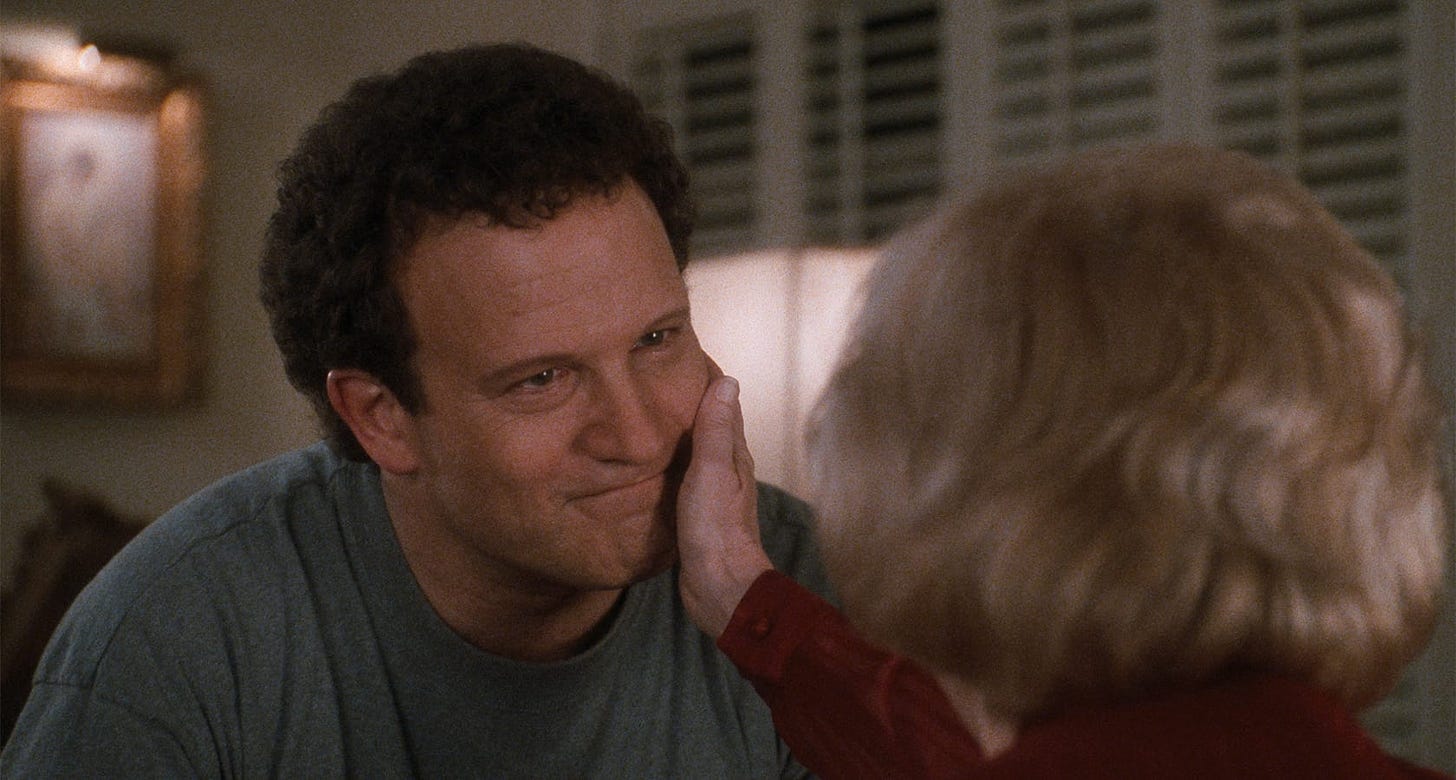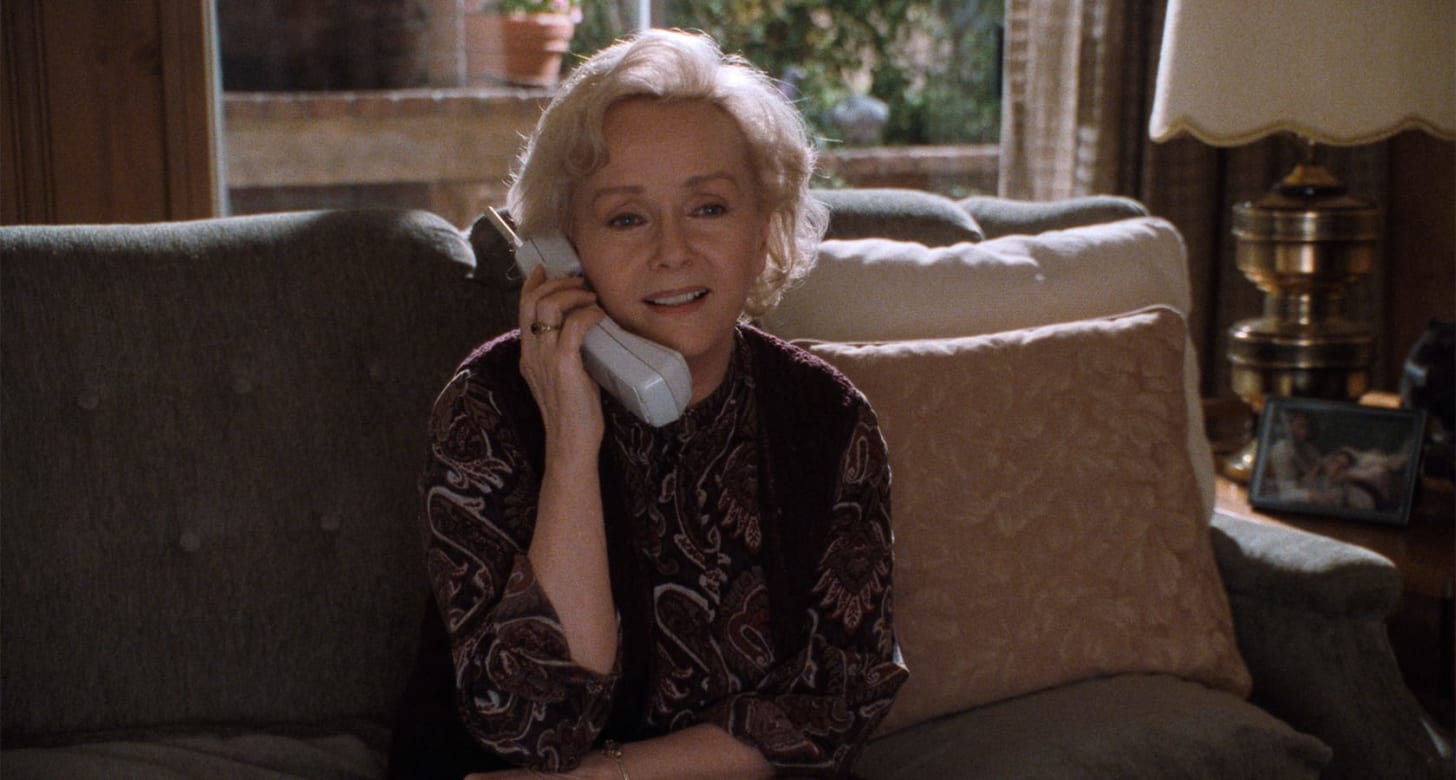Mother Of Them All
Albert Brooks' Mother (1996) is on Criterion Blu-Ray; from the archives, a couple of choice exchanges with Brooks and Debbie Reynolds
Many moons ago—the born-and-bred comic master would have been a babe of forty-nine years—I had an interview with Albert Brooks for Mother that went well
Afterwards, I caught sight of him in the hotel gift shop and thought of one last thing to ask him.
A young clerk was opening a glass case for him.
"Now, these bracelets," Brooks asks the girl, pointing to another part of the display. Pause. "Are they silver or sterling silver?"
"They're both."
"They're both. Silver and sterling silver." Pause. "Now this bracelet, is it silver or sterling silver?"
"It's sterling silver."
"It's sterling silver." Pause. "How can you tell it's sterling silver?"
Brooks looks up. "Oh, hello! Listen," he says, pointing at me, "I wanted to ask you, do you use that black leather jacket to ride motorcycles?"
My dangling question floated away. I complimented him on the tailored sea-foam green suit that suited his linebacker frame; he opened it on one side, then the other, to check the tag: "Hugo Boss!" Brooks shrugged: "You're lucky I'm not Elvis!"
Just walking. Just talking. Brooks makes sentences of cosmic comic craft.
Both comic and private, with the director being "Albert Brooks" and Albert Brooks at the same time, the scene was rich with the unabashed neurosis of Brooks' work He plays the same game of perceptions in his funny and wise Mother, casting Debbie Reynolds in her first lead in twenty-seven years, and directing her in a role no one would have expected her to shine in.
I also had a choice exchange with the then sixty-seven-year-old Reynolds in the enormous conference room at the Austin, Texas Four Seasons where interviews were transpiring.
She was wearing a figure-flattering dress with generous Décolletage. She looked great. I looked up when Reynolds entered the room, and waited for her to cross the space. As she came closer, I smiled, and all but seeing the twenty-year-old who lit up "Singin' in the Rain," I gave a wide-eyed look.
"Ha, ha," she says, looking down at her dress and asks with a big smile, "What do you see?"
I stammered, "Ah—"
"My breasts?"
"Yes," I said, "Yes, indeed."
Debbie Reynolds laughs as she takes the chair next to me, leans in: "Did you get wood?"
This is an edited version of the 1996 interview with Brooks, with added material.
Mother stars Brooks as divorcee John Henderson, a science fiction writer whose history with women is abysmal. After a date with an especially brainless younger woman (Lisa Kudrow), John arrives at the blinding insight that the relationship between his mother and himself must surely be the source of his trouble. Much to Mother's dismay, he decides to try an experiment—moving back in with her. At first, her command of the wounding put-down makes her seem like a comic Gorgon. But Brooks' tale slowly and slyly turns to something more painful, with the gags eventually turning on John. Reynolds' performance has immense subtlety and range, an assured realization of a character who grows in complexity as her son's perceptions of her evolve.
The obvious icebreaker to ask Brooks, whose conversation comes out as a perfectly wry skein of contemporary cliché and jargon, the 109-pound dragon in the room, was what his mother thought of Mother.
"Well, my mother thought this was the best of my movies," he says. "She used them to tell me this one was more commercial. She said, 'Honey, you know in this one, you don't have to die.' Actually, she said at the end of it, 'You know, I think one or two lines are from us."
When I crack up, Brooks says, "That's what I asked, 'One or two?'"
Rumors held that Brooks had first cast Nancy Reagan. "I did talk to Nancy Reagan. I never offered her the part. It was important to me that if I had a film called Mother, I wanted the role to be as close to an event as I could make it. There were a few people that you hadn't seen forever, Debbie of course, who I offered the role to. But when people asked, 'Who plays the mother?' and I said the name, I wanted people to go 'What!' or 'Oh my god!' If the actress was someone you saw in a movie in October and June and January, it's just not as special. I wanted a clean slate. When Carrie Fisher saw this movie, she was blown away. She didn't know her mother had those notes. Out of all the people I could have cast, Debbie produced that 'Omigod.'"
On the set, Reynolds continued to impress. "She would give you a hundred things. It's so much easier to cut out those ninety-nine than to say to someone, 'Please do something!' When I sent the script to Debbie, I had the most amazing five-hour conversation with her. I was talking to an actor. A method actor. She came to Los Angeles and we read two scenes, and halfway through the second one, I said, 'You have the part.' It was perfect. Right away, she became the mother. 'Yes! Take the part!'
"It wasn't hard to convince her. But nobody thought she could do a role like this. I asked her to stop performing seven or eight weeks before filming, because I wanted the Vegas person gone. Now Debbie is back to Debbie, hysterical, but in a good way. I didn't want this mother in San Francisco doing Zsa Zsa Gabor impersonations."
Brooks continues to refine his visual style, one of almost directorial invisibility. "I'm a fan of letting humans shine," Brooks says, warming to talking about his work. "For the most part, I always wonder why people move the camera so much. I like to let the actor and the words be the star. I like to be as realistic as possible in t he shooting and then use the music to make it a little more movie-like. I want the camera to be unobtrusive. I've always said to cinematographers, 'I want you to think of this as a window we're peeping through.'
"As many times as you use certain shots like close-ups to produce a reaction, I don't want an audience to know that they're watching a film. I want them to pretend they're in a room with the characters."
Has your son turned you into "Father" yet? Has parenthood affected your work? "My son is too young to have influenced anything I've done yet. I'm sure without me even realizing it, it's changing my perspective. I can't tell you how, but I'm positive it will. It changes my perspective on life. I never would have watched 'Teletubbies' on my own! I'm sure they're sinking in and I'm going to be regurgitating this in some comedic fashion that I can't tell you right now."
You didn't have "Teletubbies" as a youth, but what were your favorite characters on TV? "There was a guy in Los Angeles named Sheriff John who was very popular. Soupy Sales. Soupy Sales was everybody's favorite. You couldn't wait to come home from school and see who was going to throw a pie at. Sinatra came on the Soupy Sales Show and he threw a pie. It was like landing on the moon, it was such a big event. We all loved him. Standard stuff. I liked the Mickey Mouse Club. I liked the Little Rascals. I liked building the office and everything. I just wanted to a version where the little Rascals tried to get financing and couldn't."
Paramount, Brooks says, passed on the script, finding it too "inside." "The trouble with Hollywood is that whatever is currently happening affects today's decisions. With my luck, the day I turned in my script was the day that 'Alan Smithee' movie came out. So everyone goes, 'Nobody wants to see a movie about Hollywood!' But I'm not making that movie, and what if it's a funny movie! I argued wherever I could, but mostly, arguments don't work. I went a few different places and October [Films] was the one place that seemed friendly. I don't write my movies to be expensive. That would be impossible. If I was going to write an expensive film, I would never write them without preapproval. To get $80 million for an Albert Brooks film would never happen unless they wanted it and Tom Cruise was going to play in it. That scene where the studio executive says, 'We want you out of here by five'—how prophetic!"
So overseas financing is a no-go ? "It took Woody Allen about fifteen movies to crack that, and once you crack it, it stays cracked. That's the cool thing about overseas. Now movie after movie he does better in Paris than all the United States. At least he gets his financing. With this one, I go over there, I do my interviews, they're going 'I know you!' If I had a few more movies under my belt, maybe it would go faster."
A dangling question: plans for the millennium? (Which was only a few weeks away at the time of the interview). Brooks honors even the silly ones: "Stay home with bread and water! Get ready for the end of the world! I'm not going anywhere! Who are you kidding?





